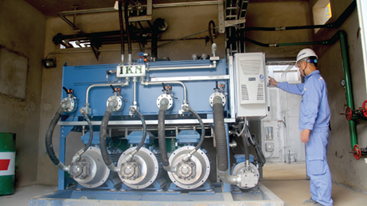Saturday, 27/07/2024 | 10:43 GMT+7
Approval of the National Energy Efficiency Program for the period of 2019-2030
On March 13, 2019, the Decision No. 280/QD-TTg on approval of the National Energy Efficiency Programme (VNEEP) for the period of 2019-2030 was issued by the Prime Minister. The VNEEP implements synchronously activities in the field of economical and efficient use of energy, showing commitments of all levels of government, associations, businesses, organizations, individuals to energy efficiency in particular and to climate change resilience and environmental protection in general.
- Overall objectives of the VNEEP are:
+ To mobilize all the national and international resources for stimulating economical and efficient use of energy through the synchronous implementation of assignments and solutions of State management, technical assistance, science and technology research and product development, market transition, human resource training and development, and also utilization of support from the international community in the field of economical and efficient use of energy;
+ To formulate the habit of using energy economically and effectively in all social activities; to reduce intensive use of energy in a variety of economic sectors and industries; energy efficiency becomes a regular activity in key energy users and key economic sectors that consume a lot of energy, with an aim at green growth and sustainable development.
- Specific objectives are:
+ Period up to 2025:
• To save 5.0 - 7.0% of the national energy consumption in the period of 2019 - 2025;
• To enhance the policy mechanism and legal regulations on energy efficiency including research, amend, and supplement contents of the Law on Economical and Efficient Use of Energy and by-law documents; finalize and supplement contents of regulations on energy consumption norms for 10-15sectors/sub-sectors in several key economic fields with intensive energy use; develop and disseminate 10-15 technical guidelines for economic sectors/sub-sectors;
• To reduce power loss to less than 6.5%;
• To reduce the average energy consumption for the industrial sectors/subsectors compared to the period of 2015-2018, specifically: (i) As for steel industry: from 3.00% to 10.00% depending on the type of products and production technologies; (ii) As for chemical industry: minimum 7.00%; (iii) As for plastic manufacturing industry: from 18.00 to 22.46 %; (iv) As for cement industry: minimum 7.50 %; (v) As for textile and garment industry: minimum 5.00%; (vi) As for beer – alcohol - beverage industry: from 3.00 to 6.88 % depending on the type of products and production scale; (vii) As for paper industry: from 8.00 to 15.80% depending on each type of products and production scale;
• To ensure 100% of the key transportation companies providing courses to disseminate skills to control technical means/solutions in exploiting and using motor vehicles in an energy-saving manner;
• To ensure that 70% of the industrial parks and 50% of the industrial clusters approach and apply solutions to use energy economically and efficiently;
• To ensure that 100% of the key energy users apply the energy management system as regulated;
• To ensure compliance and implementation of the national technical Regulations’ requirements on construction works using efficient energy for any construction works under the application scope of the Regulations;
• To ensure that 80 construction works are certified to be green works with economical and efficient use of energy;
• To develop and implement the market transformation Programme on energy efficiency for at least 5 popular products in the market;
• To give training and issue certificates to 3,000 energy management/energy audit specialists;
• To achieve 60% of schools conducting dissemination and education on economical and efficient use of energy;
• To achieve 90% of centrally-affiliated cities and provinces developing and approving plans/Programmes on economical and efficient use of energy at the local level;
• To maintain and develop the network of energy efficiency and cleaner production facilities in at least 50 centrally-affiliated cities and provinces; to develop and maintain the national energy management network;
• To build 01 energy data center of Vietnam and at least:
(i) 02 national training centers on economical and efficient use of energy;
(ii) 01 urban model of energy efficiency; (iii) 05 demonstration models on borrowing investment capital for projects on economical and efficient use of energy; 02 energy efficiency laboratories;
• To pilot the establishment of a Foundation to promote economical and efficient use of energy through socialization, financing, and cooperation of domestic and foreign individuals and organizations.
+ Period up to 2030:
• To save 8-10% of the national energy consumption in the period of 2019 - 2030;
• To reduce power loss to less than 6.0%;
• To reduce the average energy consumption for the industrial sectors/subsectors compared to the period of 2015-2018, specifically: (i) As for steel industry: from 5.00% to 16.50% depending on the type of products and production technologies; (ii) As for chemical industry: minimum 10.00%; (iii) As for plastic manufacturing industry: from 21.55% to 24.81%; (iv) As for cement industry: minimum 10.89%; (v) As for textile and garment industry: minimum 6.80%; (vi) As for beer – alcohol - beverage industry: from 4.6 to 8.44% depending on the type of products and production scale; (vii) As for paper industry: from 9.90 to 18.48% depending on each type of products and production scale;
• To reduce 5% of fuel and oil consumption in transportation compared to the forecast of the industry’s fuel consumption demand until 2030; to formulate regulations on fuel consumption for 2-wheel motorbikes and 09-or-lessseater car of new production, assembly, and importation;
• To achieve 90% of industrial parks and 70% of industrial clusters accessing and applying solutions to economical and efficient use of energy;
• To implement energy labeling programme for 50% of all kinds of building materials that require thermal insulation used in construction works;
• To achieve 100% of centrally-affiliated cities and provinces developing and approving plans/Programmes on economical and efficient use of energy a the local level;
• To achieve 150 constructions certified “green works” with economical and efficient use of energy;
• To give training and issue certificates to 5,000 energy management/energy audit specialists;
• To achieve 100% of schools conducting dissemination and education on economical and efficient use of energy.
For the detailed Decision No. 280/QD-TTg on Approval of the National Energy Efficiency Program for the period of 2019-2030, please click here.
Department of Energy Efficiency and Sustainable Development
.jpg?w=367&h=206&mode=crop) Notice for Contracts award for Support to Industrial Enterprises for Energy Audits and Preparation of Feasibility Studies (Package No. C2.2.4)
04/06/2024
Notice for Contracts award for Support to Industrial Enterprises for Energy Audits and Preparation of Feasibility Studies (Package No. C2.2.4)
04/06/2024
 Training Courses for Energy Managers and Energy Auditors
Training Courses for Energy Managers and Energy Auditors
 Vietnam Energy Outlook Report – Pathway to Net Zero
Vietnam Energy Outlook Report – Pathway to Net Zero
 Long Son Cement saves 30% of electricity consumption thanks to heat recovery
Long Son Cement saves 30% of electricity consumption thanks to heat recovery
 Expression of Interest: C2.1.15: Development of Energy-Efficient Technology Catalogs for the Industrial Sector
Expression of Interest: C2.1.15: Development of Energy-Efficient Technology Catalogs for the Industrial Sector
 Optimizing Compressed Air Systems for Southern Industrial Enterprises
Optimizing Compressed Air Systems for Southern Industrial Enterprises
 The Ministry of Industry and Trade Review the Energy Efficiency and Conservation activities in Lao Cai.
The Ministry of Industry and Trade Review the Energy Efficiency and Conservation activities in Lao Cai.
 EOI Extension: C2.2.2: Review and update for current EE benchmarking for 2 sub-industrial sectors
EOI Extension: C2.2.2: Review and update for current EE benchmarking for 2 sub-industrial sectors